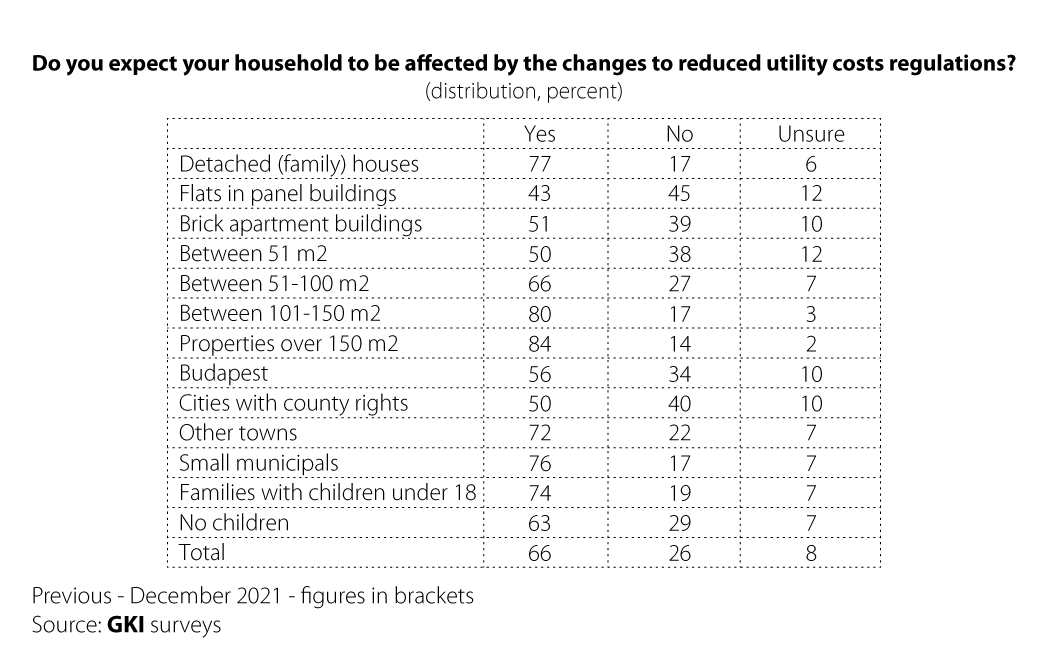Residents of detached houses or properties with a floor area of over 100 m2, people living in small towns and municipals, and families with children are the most worried. The participants are expecting an average 27,000 HUF monthly growth in household energy bills – show the results of a joint survey conducted in August by the Hungarian Economic Research Co (GKI) and Masterplast.
As part of a series of surveys, GKI’s August residential survey aimed to identify the population affected by the changes to reduced utility costs regulations, also their plans and intentions of energy-saving modernisation. Find out more about the latter topic in part two of this article. In this survey, the sample of 1000 people is representative as regards characteristics like sex, age, place of residence and qualification. Data were collected between 3 and 12 August. Since January 2020, surveys have been sponsored by Masterplast Nyrt.
Since the government announced changes to reduced utility costs related regulations, many have been concerned about how these changes will affect their lives and what household cost increase the changes will cause. At least half, but actually a whole country is doing calculations. The government estimates that the increasing household costs will impact 25-25% of the electricity and gas consumers. Experts are generally more pessimistic.
But what does the population think? According to GKI, 66% of the survey participants say that their families will be affected by the changes to reduced utility costs regulations. 26% of the participants do not expect any impacts, whereas 8% cannot or do not wish to answer the question. The survey shows that the number of people affected is much higher than what the most pessimistic experts anticipated. These somewhat exaggerated survey results may be due to the fact that this topic has gained a lot of media attention since it was announced, as basically there are no days without any new related information revealed and currently the situation is uncertain. And because a part of the population is highly affected by this factor, no wonder people are deeply interested (and worried). The following table summarises residential expectations regarding the changes to household utility costs regulations.

Thus, residents of detached houses or homes with a bigger than average floor area, people living in small towns and municipals, and families with children are expected to be affected the most by the increased utility costs.Residents of flats in panel buildings are less worried probably because there have not been any updates to district heating fees yet.
42% of the households expecting increased utility costs are anticipating an extra cost of less than 20,000 HUF, 26% are expecting an increase between 21,000 and 40,000 HUF, whereas 22% think they will have to pay more than 40,000 HUF per month in addition. One in ten households is uncertain about it. On average, survey participants expecting to be affected by increased utility costs are anticipating a cost increase of 27,000 HUF per month. (As a reference point, an average consumer, according to the government decree, pays 7,570 HUF for electricity and 14,700 HUF for gas per month. The total sum is 22,270 HUF per month.) Residents of detached houses expect to pay additional 30,000 HUF, whereas people living in apartment buildings estimate 17,000 HUF average extra costs monthly. The anticipated cost increase will grow parallelly with the floor area of homes: on average, by 19,000 HUF monthly for homes under 51 m2, and by 37,000 HUF per month for properties over 150 m2. The average monthly extra costs are 28-29,000 HUF for people living in smaller towns or municipals and 22-23,000 HUF for people in cities. Families without children or with children under 18 will pay an average of 25-30,000 HUF extra respectively.

Masterplast Nyrt.
Founded in 1997, the Masterplast group is one of the leading building material producer and distributor companies in the Central Eastern European region. The company group owns subsidiaries in 10 countries, and sells products in a further 30 countries. The company is registered in the premium category on the Budapest Stock Exchange, and had revenue of 201,8 million euros in 2022.

